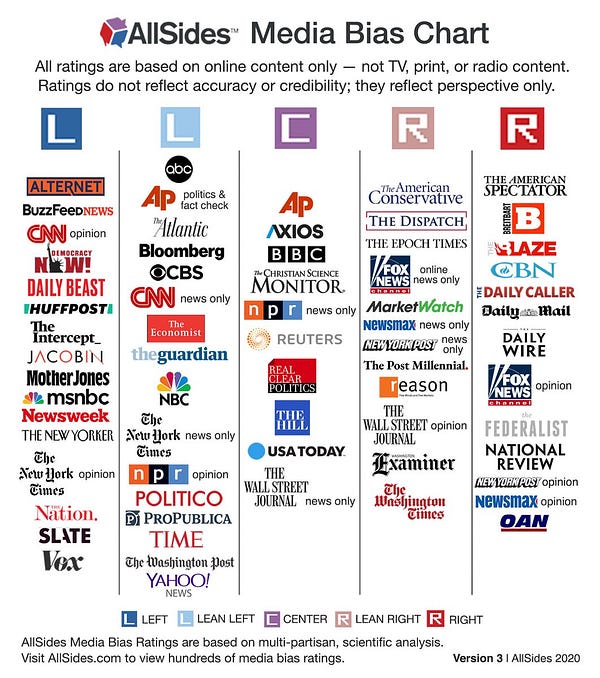The unforced errors of media, from booking to sourcing, when it comes to its role in spreading lies
Lost my mind just a couple of times.
Happy New Year! It’s good to see you. Hope you had a relaxing and safe holiday. Lots has happened since we last chatted.
When I was a lowly public relations professional, paid to place clients into all sorts of publications, I worked for an eccentric, if not morally suspect CEO who used to bark at staff: “Tell our clients to repeat their talking points nine times, that way it’ll stick at least once.”
The point was, no matter whether the talking points were true or not, if you say them often enough, you increase the odds of reporters printing that talking point.
And so we find ourselves on the fourth day of the new year on the receiving end of talking points fabricated out of thin air and turned into a cudgel against many of the virtues, if not norms, of American democracy.
But for every lie uttered, it can only manifest itself through the conduit of a mass communications tool. Enter the platforms and the news media.
While the former has shown it has little desire to blunt the spread of disinformation (outside a very narrow window), the latter, through decades of building itself as a gatekeeper and as the agenda setter, has also allowed lies and propaganda through sourcing and booking the politicians who lie to seep through; an unintended consequence of presenting both sides of a story.
The platforms are like a torrent of untruths, while newspapers and magazines and TV networks are more like that leaky faucet that you haven’t quite been able to stop from dripping. Each drip of disinformation leads to an erosion of trust.
Relying on the institutional inertia, evincing an air of objectivity, the news media has played its part in helping to give credence to conspiracy, while also deflecting criticism because “we have to hear both sides.” What happens when there is only one side inflicting damage upon our nation?
(Image via Dane Mark/iStock)
On Sunday, we once again were faced with the knowledge of a president acting immorally, if not illegally, as the Washington Post reported on an hour-long phone call in which the president proffered a slew of QAnon conspiracies regarding the election outcome, culminating in the president attempting to strong arm the Georgia Secretary of State to “recalculate” the votes of the state, overturning Joe Biden’s clear victory.


Before the Post dropped its audio recording of Trump sounding off as an 8chan board, Politico on Sunday summed up the realities of how we got here, to this very bad place:
As a reminder, here’s how this happened: Trump manufactured election fraud claims, which led his supporters to believe those false claims, which led these Republican senators to cite “unprecedented allegations of voter fraud” and “deep distrust of our democratic processes” as justification for their Wednesday plan. Circle of life.
Though no mention of the role the platforms and the media have played in serving as conduits for these false claims to flow.
Writing in his newsletter Message Box, Dan Pfieffer, former senior Obama advisor, critiques the media and political moment:
Last week, Missouri Senator and 2024 Presidential aspirant Josh Hawley interrupted the traditionally quiet week between Christmas and New Years with an announcement that he would challenge the certification of the Electoral College results. This impotent, attention grabbing stunt served its patently obvious purpose. The chattering class immediately started chattering. Hawley was the subject of a number of profiles. A Washington Post reported described Hawley as “enthralling” — a comment that reveals a dangerous detachment from the life or death consequences of politics for millions of Americans.
On Friday, CNN’s Jake Tapper reported that as many as 140 House Republicans will join Hawley in voting against certification. Not to be outdone in cynical ambition, Senator Ted Cruz announced yesterday that he and ten other Senators would join Hawley in opposing certification and demand an audit of the election results.
On Saturday, 11 Republican senators said that they would vote on Jan 6 against their states' electoral voters. In other words, the very tenets of our democracy, the right to vote, has been shattered. One of those 11 senators, Ron Johnson, also is a superspreader of lies and misinformation and conspiracy. And on Sunday, he was on Meet the Press making false claim after false claim, while Chuck Todd had a hard time keeping up.

This isn’t NBC News’ first time in the booking spotlight. A couple weeks ago, we looked at how the round-table talk show elevates, if not conflates, opinion columnists and reporters; truth-seekers and conspiracists.





CNN also tried to get the 11 Republican Senators to come on Jake Tapper’s show:

Eric Boehlert writes in his Press Run newsletter today:
Indications are that the news media have not learned. On Sunday, while describing the move by 11 extremist Republican senators to challenge Biden's certified win this week, the New York Times suggested the GOP's push to demolish election integrity merely reflects "polarized politics of Capitol Hill." Reuters gently described the Republican strategy to invalidate tens of millions of vote as simply a "long-shot" challenge. Meanwhile, for weeks, the Beltway press falsely assured news consumers that Trump’s election fraud crusade was "performance art" and "bad sportsmanship," and that Republicans would never go along.
We are at an evolutionary point of our industry, both in the newsroom and in the business. Over the weekend, I saw this chart that tried to show the political leanings of news organizations and it’s clear that our industry needs a reset in how we view ourselves.
(Quick note: AllSides, the creator of this chart, is run by John Gable, a Repubican operative who used to work for Mitch McConnell. This chart also is a great example of disinformation, as it presents as legitimate, but the methodology of segmenting these news organizations is based off of “online content” [whatever that means] and not the breadth of that news organizations reporting (i.e. print, tv, radio) and appears to cherry pick outlets’ opinion vs news sections. This is a bad and dangerous chart, but a good one to start a conversation on how to change the perspective.)
It’s time to move from an ideological frame of an outlet, one that says a media company leans left or leans right, to that of one that puts outlets as either trying to find the closest thing to truth vs spreading lies, misinformation, and propaganda.
From that, it’s also time to stop giving anonymity to people who willingly help the president and his people lie and push those lies. We have moved beyond the White House press secretary lying about something that is easily fact-checked (e.g.the size of an inauguration) to elected representatives using the airwaves to spread lies and foment mistrust in institutions. And by using anonymity too often, we set ourselves up to continually fight against misinformation.
On November 9, days after the election, a senior Republican official told the Washington Post:
“What is the downside for humoring him for this little bit of time? No one seriously thinks the results will change,” said one senior Republican official. “He went golfing this weekend. It’s not like he’s plotting how to prevent Joe Biden from taking power on Jan. 20. He’s tweeting about filing some lawsuits, those lawsuits will fail, then he’ll tweet some more about how the election was stolen, and then he’ll leave.”
Indeed.
The implications for this change of frame, from that of a political spectrum to that of truth or not can be beneficial not just to the readers a news organization serves, but to its ad partners and overall media business.
Advertisers have spent a healthy portion of the last four years trumpeting that they support journalism, while also having their ads run on sites that spread disinformation because their ad tech partners and brand safety tech partners say ‘this site is fine’ since it doesn’t mention the blocked words.


The amount of ad money that has been lost or denied to publishers because of the opacity of ad tech can perhaps be opened up if advertisers focus on sites that look for truth.
Say a lie often enough, loud enough, and pull the mass media levers long enough, and you get where we are, millions of Americans convinced that an election was stolen (it wasn’t), that a pandemic is a hoax (it’s not) and that the media is all Fake News (it isn’t).
Now imagine all the effort Republicans and the president have put into creating an election fraud narrative, and accompanying behavior, and instead coordinated a national distribution system of the coronavirus vaccines.
Thank you for allowing me in your inbox, today and every day. If you have tips, or thoughts on the newsletter, send me an email. Or you can follow me on Twitter. If you arrived here through social or a forwarded email, please consider signing up. Thanks for reading, and see you tomorrow!
Phish, “Sanity”
Some interesting links:
For fans of the funny pages:
Bill Watterson and other artists reflect on 1995, the year that comics changed forever (Washington Post)
For not knowing which half of your advertising dollar is wasted:
When big brands stopped spending on digital ads, nothing happened. Why? (Forbes)
For knowing when it’s time to jump ship:
Facebook's advertising integrity chief leaves company (Reuters)
For creating a new political newsletter to help destroy society:
Punchbowl arrives from reporters who left Politico’s Playbook (NYT)
For streaming deals:
ViacomCBS Strikes Distribution Deal With Hulu (WSJ)
Roku Nears Deal to Buy Rights to Quibi’s Content (WSJ)
For nascent unions:
Google workers launch unconventional union with help of Communications Workers of America (Washington Post)
For platforms:
Facebook fails Georgia (Popular Info)
Making sense of the Facebook menace (The New Republic)





Glad you are back and back on the saddle.
Madison Avenue deserves much more blame for underwriting right-wing misinformation than it has received. Agencies' clients shouldn't stand for what's going on. That they do reflects poorly on them, as well (or at least on their CMOs).
Back in the early 1980s, I worked with JWT. Watergate was still fresh in everyone's mind. The JWT folks I met—largely outspoken Republicans—were mortified that Bob Haldeman had been "one of ours."
That moral compass is missing on Mad Ave. today.